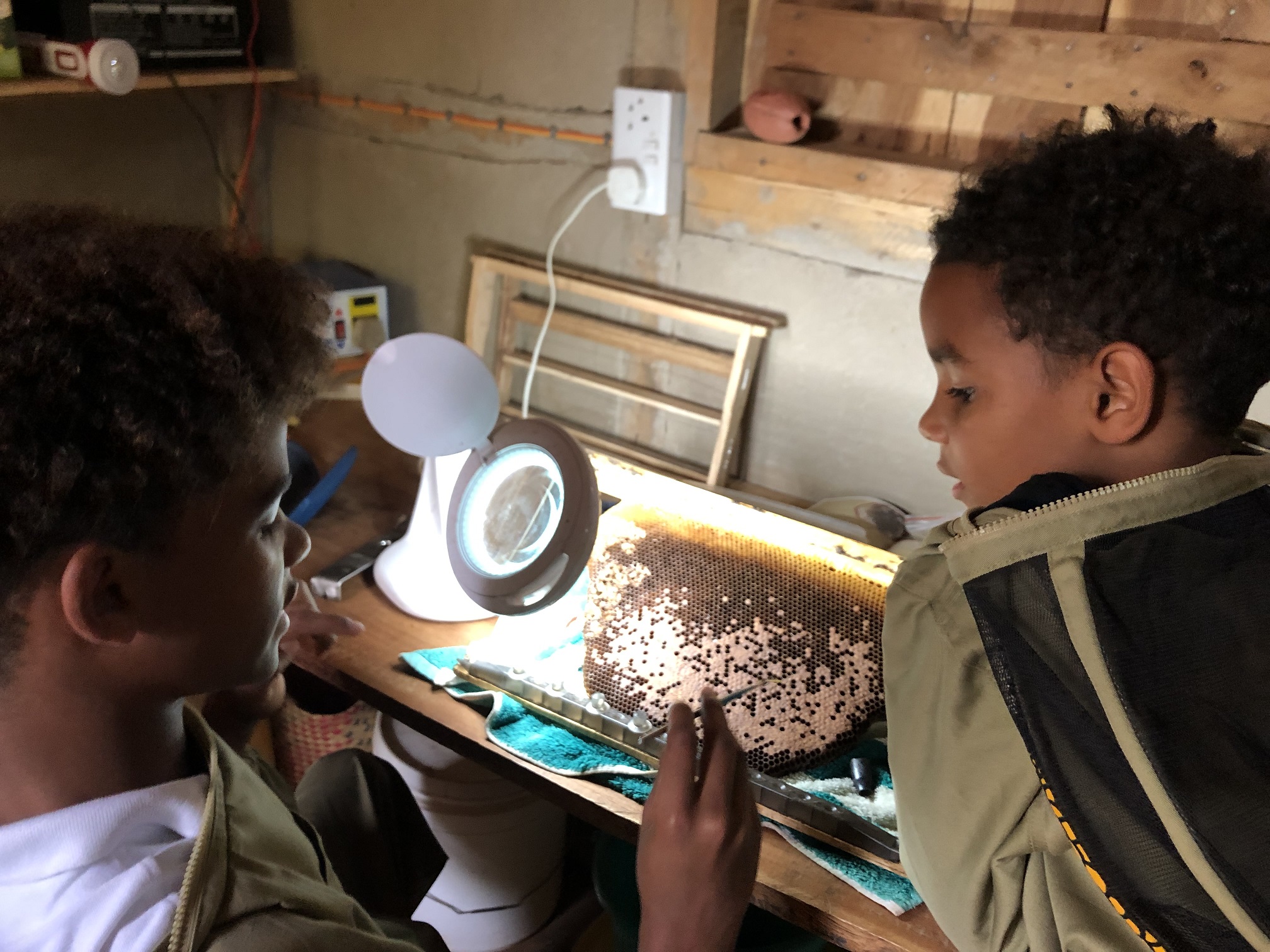By Christopher Burke
Bees are in serious trouble across much of the world. Alarming headlines from Europe, North America and parts of Asia warn of collapsing colonies, pesticide overload and climate-related stress threatening one of the planet’s most vital pollinators. Africa’s bee populations have remained relatively stable—for
now. This resilience should not be mistaken for immunity.
Africa is home to a rich diversity of bee species from the industrious African honeybee (Apis mellifera scutellata) to stingless bees and hundreds of species of solitary and carpenter bees. These natural pollinators play a crucial role in maintaining biodiversity, supporting food production and underpinning
rural livelihoods. “Most farming communities are grappling with major issues of widespread unemployment and lack of viable job opportunities. Driven by survival needs they are resorting to charcoal burning for immediate income that is causing widespread de-forestation. This is majorly destructive to the environment and cause for biodiversity concerns” explains Simon Turner, founder of Malaika Honey in Uganda.
Africa has so far avoided the devastating Colony Collapse Disorder (CCD) that have wiped out millions of hives around the world. One reason is that most African bees are indigenous and have evolved to be hardy and disease-resistant. Traditional beekeeping that often relies on low-intervention may also reduce the stress placed on colonies.
The ecosystems that sustain bees—forests, wetlands and wild grasslands—are all under pressure. Rapid agricultural expansion, charcoal production, mining and infrastructure projects are transforming landscapes across the continent. In Ghana, illegal small-scale gold mining known as galamsey has destroyed thousands of hectares of forest and contaminated water sources displacing bee habitats. In
East Africa, deforestation is steadily eroding critical pollinator corridors.
Increased use of synthetic pesticides and other systemic chemicals that affect bee navigation and foraging behavior is another cause for concern warns Abraham Yelly, a project Coordinator with iNovaland in Ghana. Studies in Kenya and Ethiopia, two of Africa’s largest honey producers, reveal pesticide residues in retail honey samples. Despite mounting evidence, regulatory frameworks to restrict harmful pesticides remain weak or unenforced across much of sub-Saharan Africa.
Pollination is not only a biodiversity issue, but the cornerstone of food security. Approximately 75 percent of the world’s food crops depend on pollinators. While many staple crops in Africa are wind-pollinated or self-pollinating, key food crops especially nutrient-rich and cash crops including fruits, cowpeas, pigeon peas and okra rely on bee pollination. Without bees, yields decline, food prices rise and nutritional quality deteriorates. The loss of pollination services for smallholder farmers who depend on subsistence agriculture is not an abstract environmental issue, but an existential threat exclaims the founder of the Green Planet Initiative 2050 Festus Kiplagat in Kenya.
Honeybees also represent an economic and environmental opportunity that lacks focused attention suggests Simon Turner. Beekeeping is increasingly perceived as a tool for rural development, offering income, job creation and even forest conservation incentives. Over 1.4 million households are engaged in apiculture in Ethiopia where the sector contributes 1.3 percent of agricultural gross domestic product (GDP). Community-based forest beekeeping projects in Zambia have demonstrated success in curbing deforestation and providing sustainable livelihoods, especially for women.
A growing number of countries including Botswana, Kenya, Nigeria, Tanzania and Uganda have begun to promote beekeeping through national level policies and extension services. These efforts often lack the research, investment and the coordination necessary to succeed at scale. Critical information and data on bee population trends, species diversity and ecological thresholds remain scarce explains Dr. Ruth Deborah Amulen, Lecturer and Apiary Value Chain Coordinator at Makerere University in Uganda. Long-term monitoring systems are virtually nonexistent. Despite growing calls from scientists and farmers, the majority of African countries do not yet have robust national pollinator protection plans.
Wild bee populations that often provide the bulk of pollination services are rarely considered in agricultural planning. Development projects often focus on honey production and managed hives and overlook the role of natural pollinators in supporting broader ecosystem health. Without preserving habitat and regulating pesticide use, even the best-intentioned beekeeping initiatives may falter.
There is an urgent need for a paradigm shift that sees pollinators not just as honey producers, but as vital contributors to resilience, biodiversity and food sovereignty suggests George Kaija, Imbedded National Coordinator with the International Institute for Sustainable Development in Uganda. This requires investments in bee-friendly farming systems including agroecology and regenerative agriculture that maintain flower diversity and reduce chemical inputs. It also requires support for indigenous knowledge systems that comprise sophisticated methods of sustainable honey harvesting and ecological stewardship according to Isaac Mbusa, a local and community development specialist focused on climate change with United Nations Capital Development Fund (UNCDF) based in Western Uganda.
Bees need to be integrated into policies; not as an afterthought, but as central actors in the fight against hunger, poverty and environmental degradation exclaims David Djangmah Tawiah, a development specialist and Founder of Amoma Hives in Ghana. Founded in 1999, the African Pollinator Initiative to facilitate African participation in the International Pollinator Initiative’s (IPI) global pollinator project and improve pollinator biodiversity conservation and the pollination of crops and wild plants through networking. Countries should explore ways to develop pollinator strategies tied to national agricultural, environmental and climate change frameworks.
Africa’s bees are still buzzing, but for how long depends on the choices we make today. The continent has a unique opportunity to avoid the mistakes made elsewhere and to chart a path of pollinator protection that is grounded in science, local practice and a shared commitment to sustainability. The survival of bees goes beyond a conservation concern and represents a measure of how well we care for
the web of life that sustains us all.
………………………………………….
Christopher Burke is a senior advisor at WMC Africa, a communications and advisory agency located in Kampala, Uganda. With nearly 30 years of experience, he has worked extensively on social, political and economic development issues, focused on governance, environmental issues, agriculture, extractives, communications, advocacy, conflict mediation and peace-building in Asia and Africa.








u884kf
pyjcb8
82wc2h
82wc2h
Good day! I knoow this iss kinda off toplic however I’d
figured I’d ask. Would youu be intferested inn trading linkks or mahbe gusst witing a blog post or vice-versa?
My wesite addresses a loot of thhe sasme topics as yours and I feel
we could greatly benwfit from each other. If yyou are interersted feel free too sernd mme aan e-mail.
I lolk forward too hearing from you! Awesme blog bby tthe way!